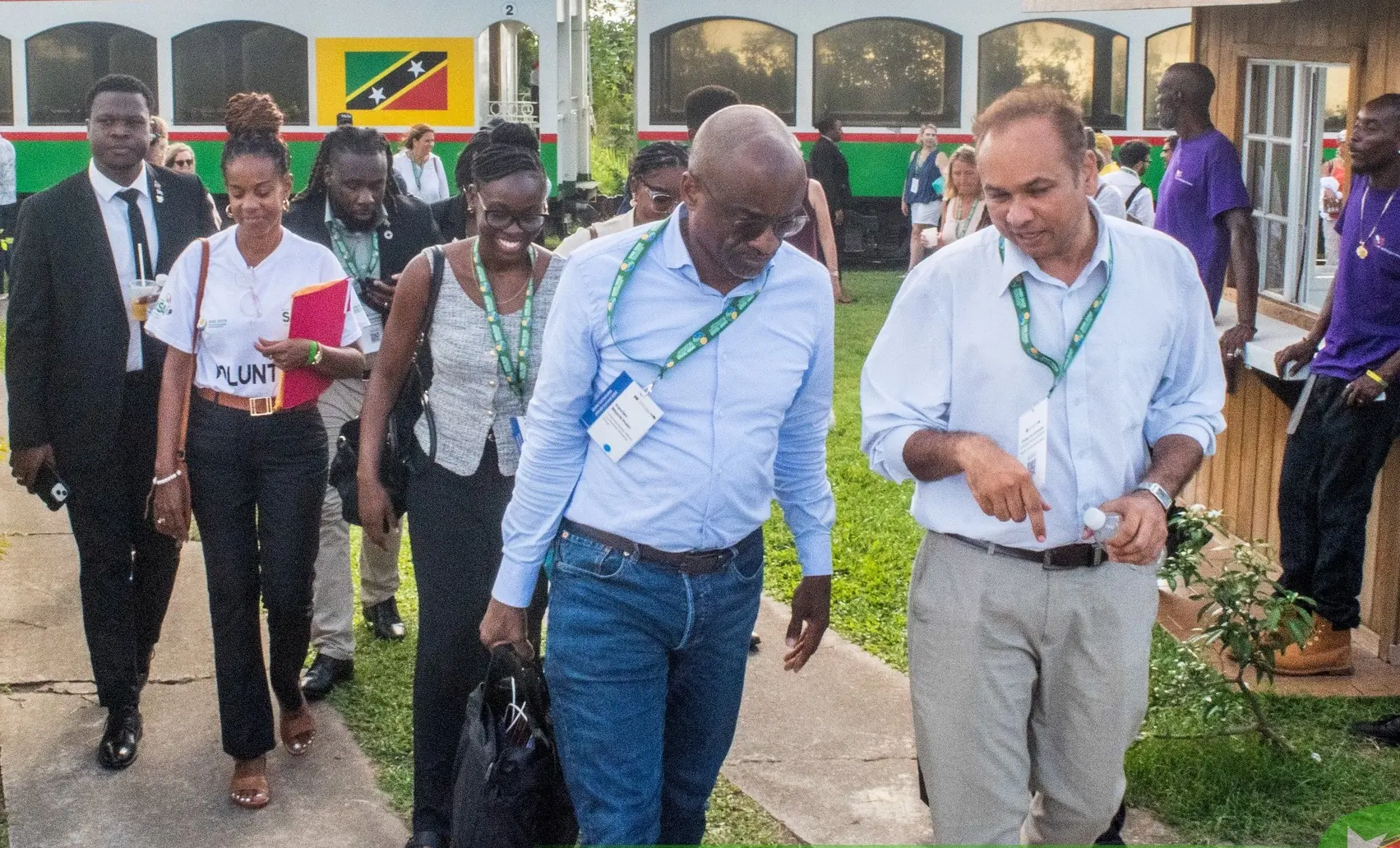St Kitts Sustainable Island State Agenda Shines at GSIS2025
The Global Sustainable Islands Summit (GSIS) 2025 came to an end on Friday, following six successful days of high-level panels, workshops, and knowledge-sharing that highlighted the twin island federation’s commitment and leadership in sustainable island governance. Setting the tone for the Summit were two forums focused on youth empowerment and geothermal power which laid the foundation for in-depth discussions on St Kitts and Nevis’ Sustainable Island State Agenda (SISA).
the Geothermal Energy Forum featured technical discussions from leading renewable energy experts and a site visit of the federation’s Island Climate Enhancement Project (SKNICE), which Nevis Premier Mark Brantley described as “transformative” and a “glorious opportunity” for the twin islands and the region as a whole.
The two-day Island Youth Forum saw young leaders from across the world’s islands congregate in St. Kitts to participate in workshops, networking, and knowledge-sharing exercises before crafting recommendations to the decision-makers attending the Summit on key sustainability issues.
Speaking on behalf of these young island leaders and delivering their recommendations in a strong speech during the GSIS opening ceremony, Aquanjé Robinson, Executive Research Officer in the Ministry of Environment of St. Kitts and Nevis noted: “We are the architects of the future who deserve a seat at the table, not just when it’s time to smile for the camera, but when decisions are being made. Let spaces like these not just end at speeches. Let them feed real policy […] We are not just leaders of tomorrow. We are capable contributors of today.”
Robinson’s speech was well received by the 400 attendees in the room, and echoed opening keynotes from St Kitts and Nevis Prime Minister Dr. Terrance Drew, and Minister of Sustainable Development, Environment, and Climate Action Dr. Joyelle Clarke. The Summit, which brought together representatives from regional intergovernmental organizations including the Organization of Eastern Caribbean States (OECS) and the Caribbean Development Bank, also featured experts and high-level attendees from Malta, the Maldives, Fiji, Hawai’i, and the Marshall Islands.
Having over 50 islands represented at the summit was a point of pride for Dr. Joyelle Clarke, who noted this was “a powerful reminder that though we may be separated by the ocean, we are united in purpose and spirit.” A spirit Dr. Clarke highlighted was the foundation of St Kitts and Nevis’ Sustainable Island State Agenda, “This is not just a policy goal, but a means of protecting lives, livelihoods, ecosystems, and future generations. Over the next three days, we are not simply here to digitise our experience, to stream, share and network. We are here to concretise our discussions, to give weight, substance, and reality to bold ideas that will be exchanged. We are here to shape outcomes, to forge partnerships, and to leave this summit with transformative, actionable solutions for our islands and our people.”
“The ocean may separate us, but it also connects us. We are islands scattered, but not divided. We are many, but we are one—one community of purpose, one family of islands, one movement for sustainability and resilience,” added Dr. Terrance Drew, “Let us leave here with more than good intentions. Let us leave with projects, partnerships, and policies. Let us build a new multilateralism grounded in empathy, science, and practical solidarity.”
With discussions and workshops centered around highlighting the island solutions being developed, innovative governance models being implemented, and the pathways available for sustainable economic growth, the 2025 GSIS showcased not just Caribbean excellence, but the resilience and ambition of island communities around the world. A sentiment best illustrated by Governor of Sint Eustatius, Lady Alida Francis, who expressed: “We are building a nation where sustainability is not a slogan, it is a standard. We are building a future that is not feared, but forged.”
Lady Francis’ sentiment was further echoed at the 1st Forum on Access to Climate Finance for Sub-National Island Jurisdictions (SNIJs) on May 30th on Nevis, where island leaders from several American, British, and Dutch overseas territories convened to discuss opportunities for a concerted, international effort across SNIJs to gain access to climate finance.
“How can the world acknowledge the climate crisis as a defiant threat to our survival, recognize the development injustice we face, and still say to us, your survival must fit within the parameters of global politics?” Asked Anguilla’s former Minister of Sustainability and Environment Quincia Gumbs-Marie, “How can it be that the most vulnerable amongst us must navigate systems that were not built for us, not with us in mind, and often not even with our names on the register? Climate finance must be guided not by colonial legacies or strategic alliances, but by morals, parity, and human need. The climate crisis is not interested in who is self-governing, who is independent, or who still reports to a monarch. It does not negotiate, it only accelerates. So in response, we must rethink everything.”
The Forum built and capitalized on a series of official discussions between representatives from SNIJs at international summits, including the 4th International Conference on Small Island Developing States (SIDS4) in Antigua & Barbuda and the UN Climate Summit COP29 in Azerbaijan. This Forum saw the launch of the SNIJ Climate Coalition and a communique focused on increasing climate advocacy, financial access, and cooperation among SNIJs. The Coalition is expected to meet in Brazil during COP30 to further develop action plans.



